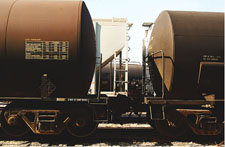If the region doesn’t address its rail congestion and infrastructure issues now, we will lose 17,000 jobs and more than $2 billion in annual economic production over the next 20 years.

Everyday, more than 37,500 rail freight cars travel through the Chicago
region, transporting everything from food to textiles to electronics, making
Chicago the rail hub of North America . Chicago is responsible for moving
one-third of the country’s rail traffic, and Chicago ’s status as the center of
the freight rail industry enriches the Illinois economy with 38,000 jobs and
more than $22 billion in economic activity.
On one hand, the freight industry is
booming and provides a powerful economic engine for the region. On the other,
the effects of freight congestion are growing: commuters are experiencing
greater delays at rail crossings, rail infrastructure suffers from a serious
lack of investment, and regional chokepoints have nearly halted the trains that
carry our nation’s goods.
Trains
travel at average speeds of less than 10 miles per hour and often take more than
three days to travel through the
Chicago
rail hub.
This costs shippers almost $40 million
annually.
Clearly, the industry’s regional
infrastructure has not kept up with increased rail demand, which affects more
than just our freight rail network.
Metra’s commuter rail network shares congested track with freight trains,
often delaying passengers.
Idling
trains waste fuel and freight is frequently diverted to less efficient trucks
thereby worsening road congestion and the region’s air and noise quality.
Even though one train can haul an
average of 280 truck trailers and move one ton of freight an average of 410
miles on just one gallon of fuel, shippers turn to trucks for their needs
because of delays.
Studies project
the region will handle 67,000 freight rail cars daily within the next 20 years,
doubling today’s traffic. As the region grows, the problems will only get
worse.
The Chicago Region Environmental and
Transportation Efficiency (CREATE) program is a public-private partnership
established by the City of Chicago, State of Illinois, and private railroads to
build 25 grade separations and modernize track in order to help reduce rail and
traffic congestion, promote economic development, and improve the quality of the
region’s environment.
With CREATE
improvements, the region’s idling motorists waiting for trains to pass would
regain more than 195,000 lost hours and 200,000 gallons of gas per year; while
passenger rail commuters would save $190 million worth of time. With
infrastructure needs estimated at $1.5 billion, the consequences of not properly
funding rail improvements would not only have devastating effects in the region,
but nationally and internationally as well.
This article was featured in Talking
Transit, MPC's bi-weekly e-newsletter. To receive the
newsletter, email talkingtransit@metroplanning.org
with 'Subscribe' in the subject line.